TENNESSEE CONFERENCE REVIEW FEBRUARY 10, 2006

BE THERE on March 26th by Supporting the ONE GREAT HOUR OF SHARING
by Jason Brock and the Emergency Response Committee, Tennessee Annual Conference
When earthquakes, floods, hurricanes, tsunamis, mudslides, tornados, and wildfires strike in the United States or across the globe, WE ARE THERE. When persons are forced from their homes or countries due to war, WE ARE THERE. When communities need training in sustainable agriculture, entrepreneurial skills, and creating safe water sources, WE ARE THERE. When children and adults are dying of HIV/AIDS or suffering from various diseases, WE ARE THERE. In so many of the world’s most desperate moments and places, WE ARE THERE because of the United Methodist Committee on Relief (UMCOR).
BE THERE this March 26th by supporting the ONE GREAT HOUR OF SHARING (OGHS) by celebrating the ministries of UMCOR in story and by giving an offering to support vital ministries around the world. All during the year, donations and grants fund ongoing projects and emergencies, with 100% of gifts going to directly support them. However, UMCOR depends on part of the OGHS offering to cover administrative costs of the home office. Up to 10% of the OGHS can be used for administrative costs, while the remainder goes to fund smaller emergencies and “filling in the gaps” for those Advance Special Projects that are not fully funded by donations or grants. For example, when Waynesboro, TN, was flooded in 2004, two days after our request, a check for $10,000 arrived for us to be able to provide food, new beds, materials, and other direct service to that community.
While UMCOR does much worldwide in development, healthcare, and food security ministries, 2004 and 2005 have seen an enormous need for their leadership and ministry in disaster response. In 2004 hurricane after hurricane hit the U.S., Caribbean, and Central America. As the year drew to a close hundreds of thousands of lives ended as villages, cities, and a way of life was swept away. In 2005 Dennis, Katrina, Rita, and other hurricanes menaced the Atlantic and Gulf of Mexico, in several cases hitting those who had not recovered from storms in past years. Florida, Alabama, Mississippi, and Texas bore the brunt of the damage, displacement, and loss of life. In the midst of dealing with these disasters at home, Pakistan and Kashmir saw some 80,000 or more perish in an earthquake, many villages still accessible only with the help of mountain climbers.
In order for us to BE THERE, we must provide UMCOR with the support they need to provide leadership, training, communication, and worldwide partnerships. UMCOR has a reputation that they--that WE--are in it for the long haul. Our goal is to BE THERE until communities and lives are restored. We can BE THERE as we support the UMCOR Advance Specials and especially during Lent by supporting the ONE GREAT HOUR OF SHARING on March 26.
Additional information and free promotional resources can be found at http://gbgm-umc.org/umcor and http://www.umcgiving.org
ORDER RESOURCES TODAY at http://www.umcgiving.org or 888-346-3862
Attractive materials are available—many in English, Spanish, or Korean.
Leaflet, combined with an offering envelope. Insert in every bulletin the day of the offering
Mini-poster. Decorate a bulletin board or church schoolroom
Refrigerator magnet. Hand out to the entire congregation, church school, and visitors
Coin Bank. Encourage children to get involved in mission!
DVD—“Be There with UMCOR.” Hear and see vignettes and real-life settings where UMCOR is your heart and hands in the world. On the same menu, “We Change the World,” music and images produced ecumenically
Worship Guide. Suggestions for hymns, litany, and prayers for One Great Hour of Sharing Sunday
Volunteers Needed at Community Care Fellowship
Each day individuals from all walks of life come in contact with each other and the presence of God at Community Care Fellowship. On a typical day you will see homeless and nearly homeless individuals demonstrating incredible courage and strength as they strive to maintain identity and a sense of personal worth while struggling against the effects of poverty and marginalization. You will also see volunteers from all parts of the city interacting, encouraging and caring for members of this community.
CCF could not operate without the many volunteers that come each day to work at the registration desk or in the hygiene room. Volunteers often form bonds with the guests that are rewarding and enriching. Jonathan, a regular volunteer on Tuesday mornings, states, “I consider the staff and many of the guests as members of my family. I look forward to seeing them each week. Most of them are more genuine than the people I deal with during the week. I feel closest to God when I’m volunteering, therefore, I’m the happiest when I’m volunteering. Praise God!”
Front desk volunteers greet the guests and register them for services, receive incoming calls, distribute mail and let guests know when it is their turn for laundry or showers. Volunteers in the hygiene room assist guests with items needed for showers, distribute clothing and first aid items.
Front desk and hygiene volunteers usually work one of two shifts during the day: 9:00 am to noon and 12:00 pm to 3:00 pm. Most volunteers prefer to work a particular shift on the same day each week, while other individuals prefer to substitute when regular volunteers need to be away. CCF has several shifts that need a volunteer. If you are interested in volunteering, please contact Rev. Pat Freudenthal at 227-1953.
The Faces of 2006 CCF Volunteers—Won’t you Join Them?
 Rev. Donna Parramore, Associate at City Road Chapel UMC, and Rev.Diane Luton Blum, part of a volunteer clergy team getting lunch ready to serve one noon.
Rev. Donna Parramore, Associate at City Road Chapel UMC, and Rev.Diane Luton Blum, part of a volunteer clergy team getting lunch ready to serve one noon.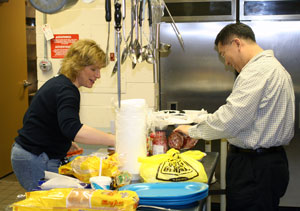 Rev. Melisa Derseweh, Charlotte-Fagan UMC, and Rev. Mosae Han, Associate at Nashville Korean UMC. Kitchen teams—lay or clergy—are needed Monday through Friday.
Rev. Melisa Derseweh, Charlotte-Fagan UMC, and Rev. Mosae Han, Associate at Nashville Korean UMC. Kitchen teams—lay or clergy—are needed Monday through Friday.
Rachel Parker is a member of Belle Meade UMC and volunteers with the Kindergarten Readiness Program. While Rachel was still in high school, she tutored children in the CCF After School program.

Mary Davis Arnold serves as a volunteer in the Kindergarten Readiness Program.

Shara Parker, West End UMC. There is an ongoing need for persons to operate the Community Care Fellowship registration desk
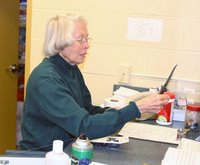
Betty Vogt, Blakemore UMC, volunteers weekly in the hygiene room.
The Second Chance to Open February 17th—A Must See Catalyst for Discussion on what the Church is all about
by Tom Nankervis with the help of Diane Luton Blum, Ben Alford, and Carla Nankervis
The Second Chance opens in Nashville on February 17th at Regal Hollywood 27, Regal Opry Millss 20, Green Hills 16, and the Carmike Wynnsong 10. It will also open at the Carmike Thoroughbred 20 in Franklin.
This is a film that cries to be seen by church groups and then discussed shortly afterwards—it explores the nature of the church, and a handy leaders guide (with accompanying video clips) is available on-line to facilitate discussion. It also deals with the church’s role in helping to solve societies’ ills—racism and poverty. I’m reminded of Dr. Martin Luther King, Jr.’s famous quote, “Either we will learn to live together as sisters and brothers or we will die together as fools.” Could it be that adult Sunday School classes from traditionally white and traditionally African American churches will want to see and discuss the film TOGETHER? The Second Chance was shot totally in and around Nashville using mainly Nashville actors and technical staff—a “gutsy” credit to the burgeoning film industry in Tennessee.
“The Second Chance is a film about two men – one from a white church in the well-to-do suburbs and one from a black church in the inner-city projects. Although founded by the same man, each church manifests its mission in a very different way. This film authentically tells the story of how the rebellious son of the founder (Michael W. Smith as Ethan Jenkins) and a street-smart pastor (jeff obafemi carr as Jake Sanders) struggle to bridge the gap between their respective churches and cultures. More importantly, at its core, The Second Chance is about being willing to step outside your comfort zone and serve where you are called.” (Synopsis from the film’s website. For an extensive leader’s guide go http://www.thesecondchancemovie.com)
 Ethan Jenkins, Jeremiah Jenkins, and Jake Sanders meet for an obvious photo-op during the Second Chance Community Church’s meal service for the poor and homeless.
Ethan Jenkins, Jeremiah Jenkins, and Jake Sanders meet for an obvious photo-op during the Second Chance Community Church’s meal service for the poor and homeless.There is a marvelous moment in the first chapter of the Gospel According to Mark when Jesus . . . new on the scene . . . teaches in a Capernaum synagogue. The congregation is overwhelmed by the content of his teaching, by the relationship he has with God, and finally with the fact that he confronts evil head on in the person of a man afflicted with evil spirits. The people spontaneously ask “What is this?” Or, my translation, “What’s going on here?” It’s the over-riding question in the entire Gospel. I therefore appreciate a soon-to-be released religious feature film that, without saying so, seems to highlight the same question. The Second Chance focuses on what the church is all about and has the nerve, rather than presenting a serious of pious niceties, to ask the church “What is this? What’s REALLY going on here?”
The Second Chance is a ground breaker in religious film history—it doesn’t give a lot of answers and it raises a lot of questions. It takes a strong look at a culture driven to show business religion and mega churches—and at a culture that allows poverty and racism to continue. There is deep faith displayed by the characters in the film but never a faith devoid of uncertainty. Christian folk are trying desperately to maintain and strengthen the church but often in the absence of any vision of what the church is or should be. I’m reminded of Bishop Felton E. May’s sermon at the Tennessee Annual Conference’s Martin Luther King celebration: “The Institutional Church must be born again and both demonstrate and live the proofs of the spirit.”
It is ironic that after six years of planning, agonizing, and attempting to market a film in the secular marketplace about “the church,” and the church’s responsibility to the dispossessed, the production team would film The Second Chance in the same year that Hurricane Katrina uncovered (or should I say “laid bare”) deep poverty in the United States.
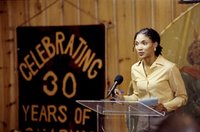
Amanda Sanders, Jake’s wife, works with prostitutes and is a stabilizing influence in Jake’s life.
The number of theological themes explored in the film is amazing—stewardship, forgiveness, redemption, loving one’s neighbor as oneself, willingness to sacrifice one’s life on behalf of others . . . but perhaps the one it wrestles with the most is “servanthood.” Christ challenged his followers to become servants, and “aye, there’s the rub.” Can you be a servant if your only commitment is financial? The members of the mega church shown in the film, The Rock, are affluent and are enthusiastic about supporting mission all over the world—but except for “photo op” day now and again are unwilling to roll up their sleeves and provide the much needed volunteers for their sister congregation in the inner city. Even when Ethan is sent into the inner city (as punishment . . . to straighten him out . . . not as a service opportunity) and begins to respond to the needs he sees there, his ministerial cohort Jake sneeringly calls him “Gucci” after the brand of shoes he wears. In the minds of the inner city workers the folks in the suburbs don’t really want to get down and dirty—or get their nice clothes soiled. True to the stereotypical image in which he has been cast Ethan initially tries to solve every problem with money . . . much to the disgust of co-laborers. It is easy to sneer at Ethan’s naivety but by the end of the picture one of the many financial investments he made pays off, so the audience doesn’t have the leisure of being able to assume that financial contributions do not have a place. THAT is another good thing about The Second Chance . . .it challenges assumptions of all kinds.
Words from Tennessee Conference Persons Who Have Seen the Film:
Ben Alford: The Second Chance is the kind of movie you don't see coming out of Hollywood; it's about real people in real settings, dealing with real life situations. I was especially interested in it because David (my son) kept telling me about it. "Dad," he said, I think you ought to see this film. It's about the church, and it focuses on important issues about how we ought to do ministry." So I saw the film, and found it compelling. Here's this mega-church umbilically connected with a powerful and effective inner-city ministry. Sounds like the perfect approach, but the devil's in the details as they say and so, the plot thickens. The characters struggle through some pretty tough situations and they're changed in the process. I found myself entering fully into the story and experiencing occasional bouts of deja vu. I think any person of faith will benefit from seeing this gutsy story and enjoy the experience as well.
Diane Luton Blum: “As a pastor, I have served congregations in the inner city and in affluent suburbs, and with Franklin First, worked to facilitate and deepen their partnership with 61st Ave UMC. The story told by The Second Chance addresses God's call to build genuine bridges between communities (and their leaders) that can remain isolated from one another in a large metropolitan area. The writers created a script that is marked by pathos and humor. Set in familiar Nashville area landscapes and cityscapes, I enjoyed the action and the plot, but more importantly I was inspired to believe that good intentions can lead beyond manipulation, that faith can guide us to just actions, and God can still gift us with community across our diverse cultures and life experience. I hope Tennessee United Methodists will not miss the chance to see The Second Chance. If we attend in great numbers, it will actually strengthen the chances of the movie's release to more audiences/markets this winter and spring.”
Carla Nankervis, Lay person, Blakemore UMC: When I was asked to a viewing of The Second Chance, I went somewhat reluctantly expecting the usual "Churchy" language and themes. Instead I was given a full plate of ideas to digest. In this film, viewers are forced to confront the fact that, as Martin Luther King, Jr. pointed out many years ago the traditional Sunday morning worship hour is the most segregated time of the week. The Second Chance doesn't just deal with racial aspects of segregation, however, it deals with those close relatives of racial discrimination: traditions, attitudes, and economics.
The conclusion of The Second Chance may, at first viewing, appear to give a clear answer for one particular inner city church but, as the viewer considers further, questions are still there for that church and THE CHURCH everywhere. We are prodded to seek and find better answers before a metaphorical wrecking ball destroys more than buildings.
Confirmation Day with Bishop Richard J. Wills, Jr. and the Cabinet, March 25, 2006
Hillcrest United Methodist Church in Nashville will be the site of the 2006 Tennessee Annual Conference Confirmation Day. The event will take place from 9:00 a.m. – 12:00 noon with gathering time set from 8:30 a.m. – 9:00 a.m.
Confirmands from throughout the Tennessee Annual Conference will have an opportunity to meet with Bishop Richard J. Wills, Jr. and participate in a small group discussion with the District Superintendent of his or her District.
The morning-long event not only allows young people involved in the Confirmation process to meet the leaders of Tennessee United Methodism, but through them to gain valuable insights on what the United Methodist Connectional System is all about.
In addition to quality time with the Bishop and District Superintendents there will be exhibits as well as small group presentations by leaders representing all aspects of church life—from United Methodist response to disaster through UMCOR to the evangelistic imperative to reach out to all people. The key question throughout the morning, as small groups move from one experience to another, is “where and how do I fit into this global church as a young person.
Hillcrest UMC is located at 5112 Raymond Lane, Nashville, TN 37211. For further information about the event contact Susan Groseclose at 615-329-1177, sgroseclose@tnumc.org
New resources address church's spiritual leadership need
by Linda Green*
NASHVILLE, Tenn. (UMNS) - The United Methodist Church's discipleship agency has announced two new initiatives aimed at building spiritual leadership among pastors and within congregations.
The announcement comes as part of a churchwide response to an urgent need identified by the 2004 General Conference, the top legislative body of the denomination. The assembly identified leadership and faith development as critical matters facing the church in the 21st century.
The two new initiatives, designed to help pastors and congregations build those leadership skills, were introduced Jan. 11 at the Board of Discipleship.
"These two companion resources squarely address the most pressing issue of the church today," said the Rev. Karen Greenwaldt, top executive of the agency. "Both initiatives are dedicated to creating spiritually formed leaders who want to improve their skills and deepen their congregation's commitment to disciple-making. The impact these resources will make will be felt for years to come."
The L3 Leadership Incubator and the Church Vitality Indicator, more than three years in the making, use a combination of cutting-edge technology and prayerful dialogue to strengthen leaders and reshape disciple-making faith communities, said discipleship agency staff. The L3 stands for "love, learn and lead."

Rev. Vance Ross
"The denomination of United Methodism has a huge elephant in the room, which is the decline and deterioration of local churches and therefore annual conferences," said the Rev. Vance Ross, an agency staff executive. Referring to an adage that holds the only way to eat an elephant is one bite at a time, Ross said the two initiatives are ways the agency "hope(s) to help local churches and therefore annual conference have some forks, knives and spoons and a place setting to begin to eat the elephant."
The Church Vitality Indicator is a subscription-based online assessment and discernment tool to identify and build upon a congregation's strengths. Using results from a 66-question survey and an influence diagraph, the indicator provides an impact report that helps lay and clergy leaders understand the state of their congregation and plan for the future. The online resource provides leaders with analytical tools and offers up to 96 possible focus areas for unlocking a congregation's growth potential, according to agency staff members.
"It is not merely an assessment but a discernment tool that leaders utilize to ... get at truth. What we are looking for is to be able to get at truth as we discern what is going on in a congregation and how to begin to move from decline and deterioration to growth, vitality and health, " Ross said.
Jill Ridenour, a member of the discipleship agency's marketing staff, said the agency took stock of what churches needed in order to grow. Analysis indicated church leaders want help in understanding their church's context and how it can grow.
"The CVI helps people in changing their congregations and helps them to continue to move forward. It is also a way for them to move beyond the church walls and see how the community affects who they are as a church and who they are as a congregation," she said.
The CVI initiative is grounded in three beliefs: that the heart of a congregation is a "community of faith," that congregations are unique and diverse, and that it takes a team to lead a congregation, said Betsey Heavner, the agency's disciplining consultant. Noting that Jesus began with a team of 12 disciples, she said the agency hopes that with the denomination's itinerant system, strong teams will be produced to maintain the church's identity when people leave.
The L3 Leadership Incubator was produced in partnership with local church pastors and denominational leaders after a 2002 pilot project with church leaders in Kentucky, who wanted to be agents of change in their communities and congregations.
The incubator provides opportunities for local church leaders and annual conference leaders to come together and "be part of connection differently than we have understood it over the years," Ross said. More than 40 incubators are currently in place around the United States.
The initiative creates a small-group environment where spiritual leaders and ideas are born, nurtured and developed. Meeting over the course of 18 months, six to 12 leaders focus on their spiritual growth and leadership skills and the development of an Incubator Ministry Action Plan.
"We have had a system that called itself a connection, but we are trying to build places and spaces where there can be relationship that is connected," Ross said.
"These L3 Incubators allow people an opportunity to share in covenant, in cooperation, and with sisters and brothers who are leaders - clergy and lay - God's dreams, God's hope and (the) opportunity to build skills to be spiritual leaders of congregations, not ecclesiastical CEOs," he said. The incubators will help congregations "release people into the world to make disciples and be disciples of Jesus Christ to turn an upside-down world right side up."
The Rev. Craig Miller, director of the Board of Discipleship's center for evangelism through new congregational development, says the L3 Leadership Incubator is more than a product. "It is really the beginning of a movement … designed to bring people together to generate new ideas" and to focus on a specific area or areas of the congregation.
Ross calls the L3 a "back to the future kind of movement" that helps leaders return to Christian conversation and become empowered to lead others to become spiritual leaders. The word "incubator" is widely used in business and education to describe a place where people can find resources, work with one another, hold one another accountable and build an environment where leaders and ideas are nurtured, Miller said. "This is the simple idea underlying the L3 Incubators."
Incubators allow United Methodist pastors and leaders who are living in isolation to come together and talk with one another in an environment of trust, love and accountability, and to develop strategies for personal and congregational ministry, Miller said.
The $250 L3 Incubator kit, developed by Discipleship Resources, contains a DVD with more than 850 slides, 24 songs with lyrics and music, seven video clips, copies of the Incubator Guidebook and an access code to the Incubator Website. In addition, the kit includes a year's subscription to the Church Vitality Indicator Website, the companion resource from the Board of Discipleship.
CVI may be used with or separately from the L3 Leadership Incubator and, like the incubator, does not require any outside facilitator or consultant. CVI subscriptions, available at the Upper Room's online bookstore, range from $49 to $400, depending on congregation size. The bookstore can be found at http://www.upperroom.org/bookstore/.
The L3 Leadership Incubator and the Church Vitality Indicator may be ordered at http://www.l3incubator.com/ and http://www.cvindicator.com/. More information is available by contacting Betsey Heavner, project coordinator, toll-free at (877) 899-2780, Ext. 7295, or by e-mail at bheavner@gbod.org.
*Green is a United Methodist News Service news writer based in Nashville, Tenn.
El Closet Del Niño Dios served over 235 children in need
by Heather Thomas. From the Nolensville Dispatch, Friday, January 27, 2006. Used by permission.
On December 17, 2005 Nolensville First United Methodist Church held its First Annual Closet del Niño Dios or Jesus’ Closet. This outreach was part of a Hispanic Ministry in the making for over a year. The aim was to assist those working in our community that needed help with gifts for their children for Christmas! The first “Jesus Closet” for the Hispanic community served over 235 children in the area.
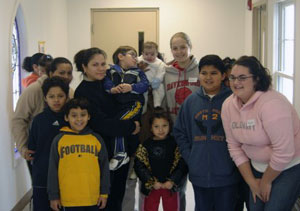 Lauren Walsh and Arden Sparks, two youth from Nolensville First UMC, with members of the Hispanic congregation who assisted in the "Jesus' Closet" distribution.
Lauren Walsh and Arden Sparks, two youth from Nolensville First UMC, with members of the Hispanic congregation who assisted in the "Jesus' Closet" distribution.Each family could shop for clothes and toys for their children. In addition they all received a stuffed animal, a Bible for their family, information about social services available and love from the Nolensville community. Thanks to our friends at GC Landscaping, those without a Christmas tree were given one free of charge. Two Way market has offered job opportunities. A living room suit was donated as a raffle and Bricks Café provided refreshments. Dollar General set up a toy collection box and donated toys given by our neighbors.
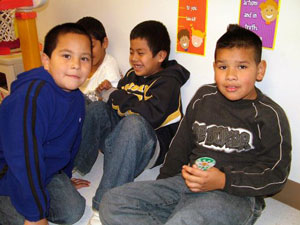
Over 235 children had a much happier Christmas because of El Closet Del Niño Dios
The day was a beautiful outpouring of love to these people. We received so much from our Hispanic friends at the Church of the Nazarene, the Spanish club at Ravenwood High School, local business’ and countless members of our congregation and Ebenezer UMC who came out to give their time and translation skills. It was a beautiful day of sharing God’s love across cultural, language and income lines. Our rainbow coalition has added another color! Thanks to all of those who donated and thanks be to God!
Plans have already started for next year’s event. If you would like to get involved, please contact Heather Thomas at heather.thomas@gsquaredwireless.com .
United Methodist Men's ministry gets new home
by Rich Peck*

The Commission on United Methodist Men will occupy the former Nashville, Tenn., office of the church's finance agency in mid-February. Photo courtesy of the Commission on United Methodist Men
The United Methodist agency responsible for men's ministries will soon have a home of its own for the first time since its creation in 1996.
The Commission on United Methodist Men will move to Music Row, an area populated by the country music industry. Until now, the nine-member staff has occupied crowded rooms in the Kern Building, a structure owned by the United Methodist Board of Discipleship. The building also houses offices of the discipleship agency and the Board of Higher Education and Ministry.
The commission bought a building formerly owned by the Nashville office of the General Council on Finance and Administration. The 4,200-foot structure became available when the finance agency moved to a larger space nearby, where it consolidated its Nashville operations and its main office from Evanston, Ill.
The men's commission received permission to buy the $750,000 building from its 24-member board of directors, GCFA, and the denomination's Connectional Table.
Following the purchase, the commission renovated the bathrooms to make them handicapped accessible and established a large conference room with a movable divider so commission meetings can be held in the one-story building.
The agency also changed the entry door, bought new carpets and made other repairs totaling about $100,000. The agency borrowed $600,000 from the United Methodist Men Foundation, an endowment fund that receives funds for scouting and men's ministries from United Methodist groups and individuals. The balance was paid by commission reserve funds.
The commission expects to move into the building in mid-February.
The agency is also in the process of selecting a new top staff executive. The Rev. Joseph Harris, general secretary since the birth of the agency, resigned last June to become the assistant to the bishop of the Oklahoma Area and director of communications for the Oklahoma Annual (regional) Conference. A search committee, led by Bishop James King of the Louisville (Ky.) Area, expects to nominate a new top executive in the next few months. Bishop William W. Morris, retired, is serving as interim general secretary.
*Peck is communications coordinator for the churchwide Commission on United Methodist Men.
Food Bank Benefit Concert to Highlight Composers with Local Ties
Music by two composers with ties to Nashville will be featured prominently in an early- March concert to benefit Second Harvest Food Bank of Middle Tennessee.
About 40 area musicians, known as the Second Harvest Symphony, will participate in the event, set for 4 p.m., March 5, at West End United Methodist Church, 2200 West End Ave., Nashville. Admission is free, but the audience is asked to donate money or non-perishable food to Second Harvest Food Bank.

Irving Kane
Among the selections to be performed is Divertimento by the late Irving Kane, who lived in Nashville. A classical and jazz trombonist, Kane was known for his sardonic and outrageous wit, which is often evident in his music. Kane portrayed "Tennessee Trash" on the ad campaign for a cleaner Tennessee.
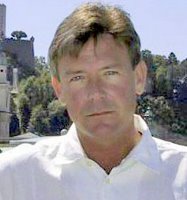
Timothy Hubler
Another selection, Die Gipfelfanfare by Timothy Hubler, former musical director of the Tennessee Repertory Theater, was composed for the 1992 Salzburg Music Festival Governor's Reception. Hubler's composing credits include A&E Network, National Geographic, and Centennial Symphonettas for the Firestone Centennial Celebrations in Las Vegas and Nashville. Hubler now lives in Salzburg, Austria.
Concerto for Flute and Harp, with soloists Erik Gratton and Licia Jaskunas, will honor the 250th anniversary year of composer W. A. Mozart's birth. The program also includes Pulcinella Suite by Igor Stravinsky. Conductor is Belmont University's Christopher Norton.
The group's annual series of concerts to benefit Second Harvest began in 2000, a result of the efforts of a handful of Nashville professional musicians who were seeking a way to contribute their time and talents to a worthy community cause. Eventually, a large number of area musicians embraced the idea, and continue to devote time and talent to producing each concert.
Second Harvest Food Bank of Middle Tennessee has been operating in Middle Tennessee since 1978. It is one of the largest and most comprehensive of more than 200 food banks and food distribution centers nationwide, collecting, inspecting and distributing millions of pounds of food annually to soup kitchens, pantries and shelters. In Middle Tennessee, 47 percent of the people Second Harvest serves are children.
Posters, graphics and more information are available from Nancy Jackson, (615) 298-7709, e-mail nanjojac@comcast.net.
Louise Short Thanks Those Who Helped Celebrate her 100th Birthday
Nothing is dearer than having beloved friends rejoice with you. Your many cards with hand written messages brought tears of joy and humility.
I thank all of you for your many ways of rejoicing with me on my 100th birthday.
My love and prayers,
Louise Short
Child of God, Oliver Loftis
? – 2006a
Memorial by Rev. Nancy Neelley
On January 15, I received the news that Oliver had died. Oliver Loftis – the homeless man who befriended me through worship at 61st Avenue UMC – had died after a stroke. During the time I knew Oliver, he was either living in a truck or any other warm/dry place he could manage. In November 2003, Oliver and I happened to sit together in worship when he reached over and put five dollar bills in my hand, saying that he’d had a good day and wanted to give me a gift. I was so deeply touched that I shared the story with others. My friend Debbie Alvarez cautioned me that I’d been given five “talents” and that I better pray about what I was going to do with them. God inspired me to start a fund called “Oliver’s Gift” at Hillcrest and ask others to match his gift of $5. Since then, that $5 has multiplied many times over, providing people around the world with a way to survive and even thrive through Heifer International donations. Oliver was so proud of this legacy that he even added to it when he could.
We never know what goodness dwells in the people we pass by on the side of the road, laying on heating grates or propped on park benches. Oliver’s life was definitely lived on the margins of society and at times his behavior alienated even those closest to him. But I got to see a glimpse of Christ through the gift that he gave and for that I am truly grateful. May God bless his soul.

<< Home